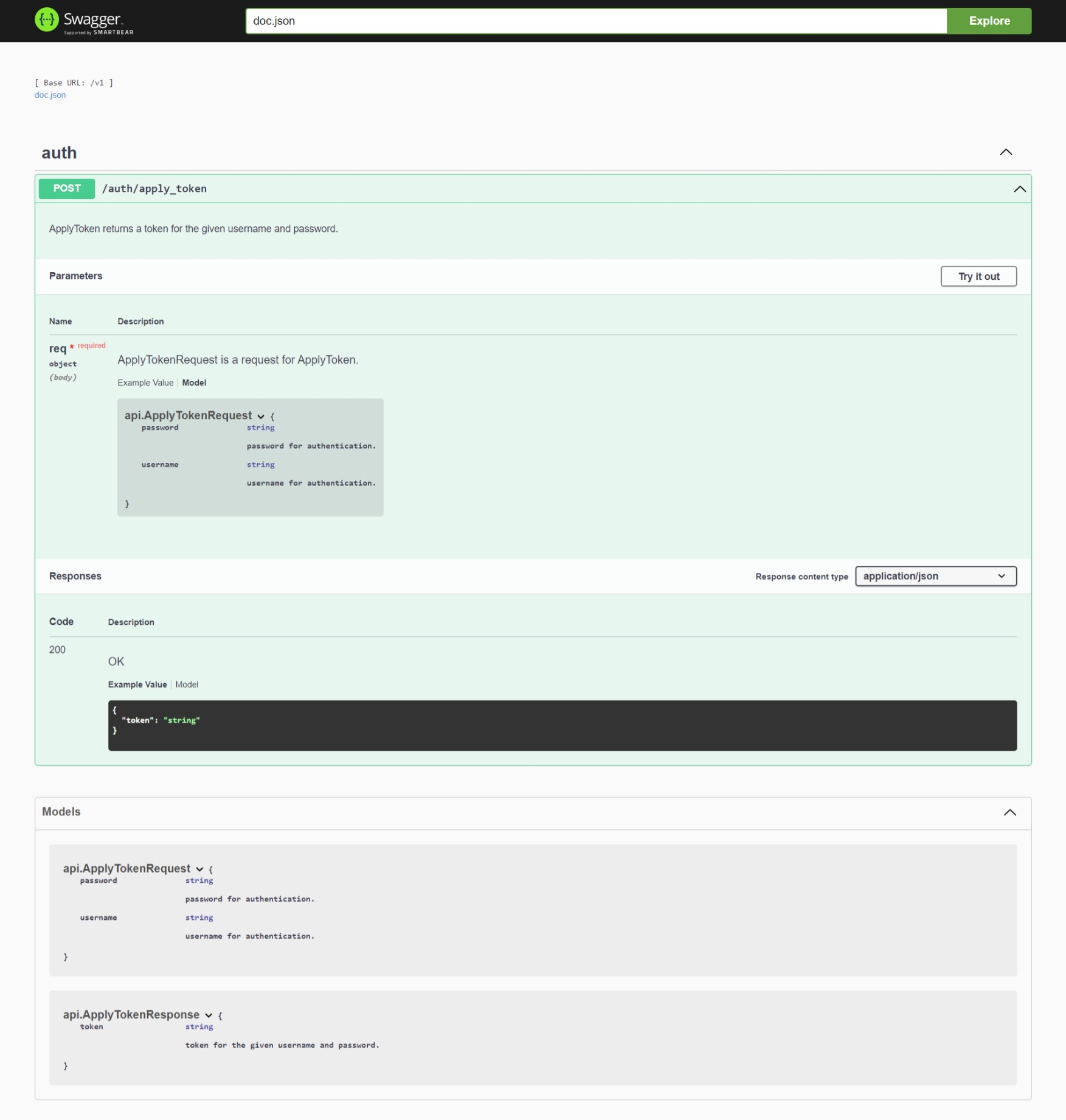Generating Go code for Echo Web Framework from protobuf.
~
go install github.com/dualface/protoc-gen-go-echo-http/cmd/protoc-gen-go-echo-http@latest~
The full example is in the example directory.
~
Create the file auth.proto:
syntax = "proto3";
package api;
option go_package = "example/api";
// AuthService is a service for authentication.
service AuthService {
// ApplyToken returns a token for the given username and password.
rpc ApplyToken(ApplyTokenRequest) returns (ApplyTokenResponse) {}
}
// ApplyTokenRequest is a request for ApplyToken.
message ApplyTokenRequest {
string username = 1; // username for authentication.
string password = 2; // password for authentication.
}
// ApplyTokenResponse is a response for ApplyToken.
message ApplyTokenResponse {
string token = 1; // token for the given username and password.
}Use the protoc command to generate Go code:
protoc --go_out=. --go-echo-http_out=. auth.protoWhen the command is successfully executed, the following files will be generated:
auth.pb.go: The protobuf definition.auth_http.pb.go: The HTTP interface definition for Echo framework.
~
After generating the interface definitions, these interfaces need to be implemented.
Create the file auth_impl.go:
type (
// AuthServiceImplement is a implementation of AuthService.
AuthServiceImplement struct {
UnimplementedAuthService
}
)
func (s *AuthServiceImplement) ApplyToken(c echo.Context, req *ApplyTokenRequest) (resp *ApplyTokenResponse, err error) {
username := strings.ToLower(strings.TrimSpace(req.Username))
password := strings.TrimSpace(req.Password)
if len(username) == 0 {
return nil, c.String(http.StatusBadRequest, "username is required")
}
if len(password) == 0 {
return nil, c.String(http.StatusBadRequest, "password is required")
}
if username != "testuser" || password != "testpwd" {
return nil, c.String(http.StatusUnauthorized, "invalid username or password")
}
return &ApplyTokenResponse{
Token: "you_got_a_token",
}, nil
}~
Using interfaces in main.go:
func main() {
e := echo.New()
group := e.Group("/v1")
// BindAuthService binds the AuthServiceImplement to the group.
api.BindAuthService(group, &api.AuthServiceImplement{})
e.Logger.Fatal(e.Start(":12345"))
}Start service:
____ __
/ __/___/ / ___
/ _// __/ _ \/ _ \
/___/\__/_//_/\___/ v4.10.2
High performance, minimalist Go web framework
https://echo.labstack.com
____________________________________O/_______
O\
⇨ http server started on [::]:12345
Testing the interface using curl:
curl -v \
'http://localhost:12345/v1/auth/apply_token' \
-H 'Accept: application/json' \
-H 'Content-Type: application/json' \
-d '{"username":"testuser","password":"testpwd"}'The expected result should be:
< HTTP/1.1 200 OK
{
"token": "you_got_a_token"
}
Invalid parameters can be passed in to test the error handling of the interface:
curl -v \
'http://localhost:12345/v1/auth/apply_token' \
-H 'Accept: application/json' \
-H 'Content-Type: application/json' \
-d '{"username":"no","password":"no"}'< HTTP/1.1 401 Unauthorized
invalid username or password
You can keep trying.
~
Install swaggo:
https://github.com/swaggo/swag
```bash
go install github.com/swaggo/swag/cmd/swag@latestGenerate swagger documents:
swag init> Generate swagger docs....
> Generate general API Info, search dir:./
> Generating api.ApplyTokenRequest
> Generating api.ApplyTokenResponse
> warning: route POST /auth/apply_token is declared multiple times
> create docs.go at docs/docs.go
> create swagger.json at docs/swagger.json
> create swagger.yaml at docs/swagger.yaml
Swagger documentation can be added to the HTTP service.
Modify the file main.go:
import (
"example/api"
"example/docs"
"github.com/labstack/echo/v4"
"github.com/labstack/echo/v4/middleware"
"github.com/labstack/gommon/log"
echoSwagger "github.com/swaggo/echo-swagger"
)
func main() {
e := echo.New()
e.Debug = true
e.Use(middleware.LoggerWithConfig(middleware.DefaultLoggerConfig))
e.Logger.SetLevel(log.DEBUG)
group := e.Group("/v1")
api.BindAuthService(group, &api.AuthServiceImplement{})
docs.SwaggerInfo.BasePath = "/v1"
e.GET("/v1/swagger/*", echoSwagger.WrapHandler)
e.Logger.Fatal(e.Start(":12345"))
}Use your browser to view Swagger documentation:
http://localhost:12345/v1/swagger/index.html
The full example is in the example directory.
